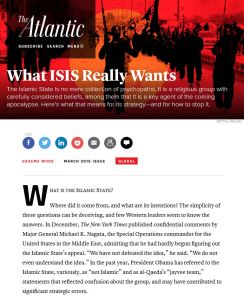Join getAbstract to access the summary!

Join getAbstract to access the summary!
Graeme Wood
What ISIS Really Wants
The Atlantic, 2015
What's inside?
An exploration of Islamic State’s apocalyptic agenda sheds light on how to combat it.
Recommendation
Governments across the world have proclaimed Islamic State (ISIS) to be “un-Islamic.” In this hotly debated and widely read article, journalist Graeme Wood argues they are wrong and that to deny the deeply Islamic nature of the organization is to miss an opportunity to understand, and ultimately, destroy it. Drawing on interviews with leading scholars, as well as with Islamic State adherents and recruiters, Wood lays out the group’s interpretation of Islam and explains how its fundamentalist religious views shape its practices and objectives. The article has garnered some criticism for giving too much weight to the group’s fringe religious beliefs while excluding the complex political, social and economic forces that drive terrorism in the region. While always politically neutral, getAbstract recommends Wood’s deeply researched insights to policy makers, national security experts, and concerned citizens who want to understand the religious ideology that underpins ISIS and how that information can be used to defeat it.
Summary
About the Author
Graeme Wood is a contributing editor at The Atlantic.
















Comment on this summary